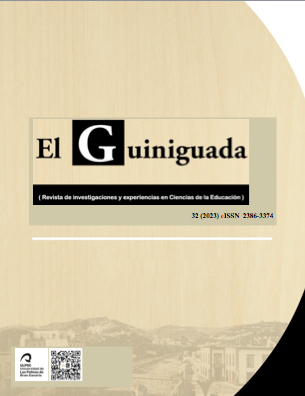Testing conversational implicature in the TOEIC examination. Investigando la Implicatura Conversacional en el Examen de TOEIC.
doi.org/10.20420/ElGuiniguada.2022.508
Keywords:
implicatura conversacional, enseñanza del inglés como segunda lengua, examen de TOEIC, conversational implicature, teaching English as a second language, TOEIC examAbstract
The incorrect inference of conversational implicature might often lead to communicative breakdown among interlocutors who share the same L1, and it may certainly entail an extra degree of effort on the part of L2 language learners. For this reason, it should be tackled in L2 courses so that students are prepared to engage successfully in realistic communication. However, teaching learners to infer pragmatic meaning correctly when faced with conversational implicature raises the question of how to test whether these learners have managed to infer such pragmatic meaning. This paper intends to expand research in this area by focusing on the TOEIC examination (Test of English for International Communication) in a group of fifty university students who have taken the latest version of the exam, where conversational implicatures are included in the Listening and Reading sections. Results show that learners seem to perform better in the Listening section than in the Reading section thanks to paralinguistic cues. Reading comprehension items pose more problems and might benefit from explicit instruction and a higher linguistic competence.
Downloads
References
Bouton, L. F. (1988). A cross‐cultural Study of Ability to Interpret Implicatures in English. World Englishes, 7(2), 183-196.
Bouton, L. F. (1992). The Interpretation of Implicature in English by NNS: Does It Come Automatically--Without Being Explicitly Taught? Pragmatics and Language Learning, 3, 53-65.
Bouton, L. F. (1994a). Conversational implicature in a second language: Learned slowly when not deliberately taught. Journal of pragmatics, 22(2), 157-167.
Bouton, L. F. (1994b). Can NNS Skill in interpreting implicature in American English be improved through explicit instruction? A pilot study. Pragmatics and Language Learning 5, 88-108.
Bouton, L. F. (1999). Developing Nonnative Speaker Skills in Interpreting Conversational Implicatures in English. Culture in second language teaching and learning, 30(1), 47-70.
Grice, H. P. (1975). Logic and conversation. In P. Cole & J. Morgan (Eds.), Syntax & Semantics (Speech Acts ed., Vol. 3, pp. 41–58). Academic Press.
Köylü, Y. (2018). Comprehension of conversational implicatures in L2 English. Intercultural Pragmatics, 15(3), 373-408.
Li, Q. (2016). Conversational implicature in English listening comprehension teaching. Theory and Practice in Language Studies, 6(10), 2044-2051.
Pratama, H., Nurkamto, J., Rustono, R., and Marmanto, S. (2017). Second Language Learners' Comprehension of Conversational Implicatures in English. 3L: Language, Linguistics, Literature®, 23(3), 50-66.
Roever, C. (2013). Testing implicature under operational conditions. In Assessing Second Language Pragmatics (pp. 43-64). Palgrave Macmillan.
Shively, R. L., Menke, M. R., & Manzón-Omundson, S. M. (2008). Perception of irony by L2 learners of Spanish. Issues in Applied Linguistics, 16(2).
Sperber, D., & Wilson, D. (1986). Relevance: Communication and cognition (Vol. 142). Cambridge, MA: Harvard University Press.
Taguchi, N. (2005). Comprehending implied meaning in English as a foreign language. The Modern language journal, 89(4), 543-562.
Taguchi, N. (2008). Pragmatic comprehension in Japanese as a foreign language. The Modern Language Journal, 92(4), 558-576.
Taguchi, N., Li, S., & Liu, Y. (2013). Comprehension of conversational implicature in L2 Chinese. Pragmatics & Cognition, 21(1), 139-157.
Wang, H. (2011). Conversational Implicature in English Listening Comprehension. Journal of Language Teaching & Research, 2(5).
Zhang, S. (2006). Investigating the relative effects of persons, items, sections, and languages on TOEIC score dependability. Language Testing, 23(3), 351-369.
Published
How to Cite
Issue
Section
License
Authors who publish with this journal agree to the following terms:
- Authors retain copyright and grant the journal right of first publication with the work simultaneously licensed under a Creative Commons Attribution License that allows others to share the work with an acknowledgement of the work's authorship and initial publication in this journal. You can not make a commercial use of the work. The use derived from the work is also not allowed.
- Authors are able to enter into separate, additional contractual arrangements for the non-exclusive distribution of the journal's published version of the work (e.g., post it to an institutional repository or publish it in a book), with an acknowledgement of its initial publication in this journal.
- Authors are permitted and encouraged to post their work online (e.g., in institutional repositories or on their website) prior to and during the submission process, as it can lead to productive exchanges, as well as earlier and greater citation of published work (See The Effect of Open Access).
















